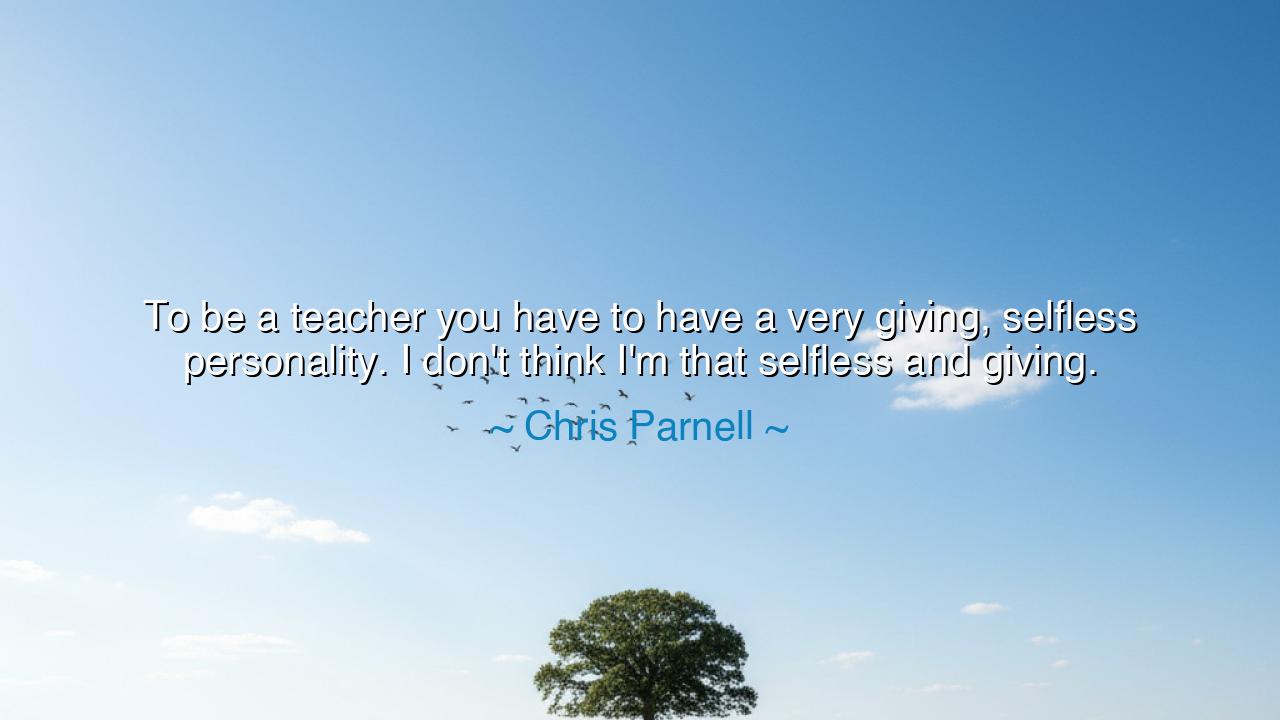
To be a teacher you have to have a very giving, selfless
To be a teacher you have to have a very giving, selfless personality. I don't think I'm that selfless and giving.






When Chris Parnell confessed, “To be a teacher you have to have a very giving, selfless personality. I don't think I'm that selfless and giving,” he spoke not merely of his own humility, but of a truth as old as time itself: that teaching is among the noblest of callings, and it demands of the soul a surrender beyond ordinary measure. To guide others is to step out of one’s own shadow and into the light of another’s becoming. It is to place the growth of another above the comfort of the self. Not all are called to this path, for it requires the heart to beat not for itself alone, but for the shaping of many hearts yet to unfold.
The teacher’s burden is not light. To teach is to pour forth without expecting to be filled, to give patience even when weariness weighs the spirit, to sow seeds of wisdom though one may never live to see their fruit. This is why Parnell, though an accomplished actor and performer, acknowledged with honesty that he did not possess this endless well of giving. He recognized that selflessness is the cornerstone of true instruction, and that without it, the teacher’s voice, however wise, may ring hollow. Thus, his words are not an admission of weakness but a testimony to the exalted height of the teacher’s calling.
Consider the life of Confucius, the great sage of China. He wandered from state to state, often impoverished, sometimes rejected, yet he never ceased to teach. He gave not for riches, not for glory, but because he believed that in the cultivation of virtue in others lay the salvation of society. His disciples—men such as Mencius and Zengzi—carried his words far beyond his lifetime. Was he rewarded fully in his day? No. But his selfless giving shaped centuries of thought. Confucius teaches us that the teacher must be content to be the root, unseen beneath the earth, while others stand tall as the tree.
In contrast, reflect upon those who sought only their own gain in instructing others. History remembers them not as teachers but as tyrants of thought. Their lessons were prisons, not paths. The difference lies in what Parnell points toward: the personality of giving. Without generosity of spirit, instruction becomes coercion; without selflessness, guidance turns to manipulation. The true teacher empties themselves so that another may be filled.
What, then, shall we learn from Parnell’s humility? We learn first that not every soul is destined to be a teacher, for not every soul is willing to lay itself down in service of others. And this is no shame. For each calling has its own burdens, and honesty about one’s own nature is itself a virtue. Yet we also learn that in any role—whether as a parent, a friend, a leader, or an artist—there are moments when the spirit of the teacher is demanded of us. To rise in those moments is to embrace temporarily that mantle of selflessness, even if it is not the permanent shape of our lives.
The lesson for the seeker is this: honor the teachers in your life, for they have chosen a path that drains and yet sustains, that asks much and gives little in return. Be grateful for their sacrifice, for behind every lesson you have learned stands an unseen labor of patience, sacrifice, and care. And when your turn comes to guide another—whether a child, a colleague, or a stranger—remember Parnell’s words, and ask yourself: can I be giving now? Can I be selfless for this one soul’s sake?
Practically, let each of us act by cultivating gratitude toward those who have taught us. Write to a teacher, a mentor, or a guide from your past, and acknowledge their gift. When guiding others, practice patience even when it strains you, and give not for recognition but for their flourishing. And when you sense that you cannot give selflessly, step aside with honesty, as Parnell did, for better to confess one’s limits than to wear the teacher’s cloak without the heart required to bear it.
Thus, in Parnell’s words lies not merely modesty, but a torch of discernment. He reminds us that true teaching is sacrifice, that selflessness is the lifeblood of instruction, and that to wear the title of teacher is to commit oneself to the labor of love. Let us remember this, and in our turn, become givers where we can, even if only for a moment, so that the chain of wisdom may never be broken.






AAdministratorAdministrator
Welcome, honored guests. Please leave a comment, we will respond soon